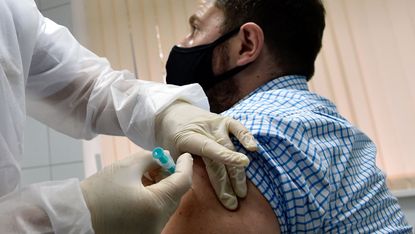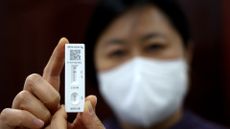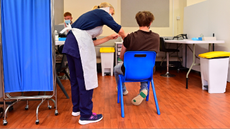Russians spreading fake news about Oxford vaccine
Online disinformation campaign targets countries where Russia’s immunisation jab is being marketed

Russian officials have been involved in spreading false reports that a British-made Covid-19 vaccine in the final stage of testing could turn people into monkeys, an investigation has found.
The injection, developed by Oxford University and AstraZeneca, uses a virus found in chimpanzees to prime the human immune system with deactivated proteins from the new coronavirus.
The Russian disinformation campaign “has the potential to damage not just the Oxford programme but the wider global effort to protect against the virus by encouraging conspiracy theorists and the anti-vaccination movement”, The Times reports.
Subscribe to The Week
Escape your echo chamber. Get the facts behind the news, plus analysis from multiple perspectives.

Sign up for The Week's Free Newsletters
From our morning news briefing to a weekly Good News Newsletter, get the best of The Week delivered directly to your inbox.
From our morning news briefing to a weekly Good News Newsletter, get the best of The Week delivered directly to your inbox.
The newspaper says it was alerted to the spread of “pictures, memes and video clips depicting the British-made vaccine as dangerous” by a whistle-blower who was “concerned at the damage it would do to public health efforts”.
Along with Western websites, the principal targets were India and Brazil, where the Russian government is attempting to sell its own Covid-19 jab.
Earlier this week, Vladimir Putin “announced the approval of a second new coronavirus vaccine in as many months”, reports NPR, but “neither has completed the kind of extensive and rigorous three-phase trials required in the US” and other Western countries.
Putin said his own daughter has been given the first Russian vaccine, known as Sputnik V, but scientists inside the country and abroad have expressed doubts about the safety of the jab.
A surgeon in Moscow who spoke to CNN on the condition of anonymity said that after being offered the injection, he “called the doctors who deal with vaccinations, I called immunologists. They said, ‘Don't do it, by no means, the vaccine is raw.’”
Although it is unclear who directed the fake news campaign about the UK vaccine, The Times says “there is evidence that some Russian officials were involved in its organisation and dissemination”.
Tom Tugendhat, who chairs the Commons Foreign Affairs Committee, has pointed a finger at the Kremlin.
“Russia is a very centralised state and the idea this would be done without the approval of someone in the inner circle is laughable,” he told Times Radio.
Create an account with the same email registered to your subscription to unlock access.
Sign up for Today's Best Articles in your inbox
A free daily email with the biggest news stories of the day – and the best features from TheWeek.com
Holden Frith is The Week’s digital director. He also makes regular appearances on “The Week Unwrapped”, speaking about subjects as diverse as vaccine development and bionic bomb-sniffing locusts. He joined The Week in 2013, spending five years editing the magazine’s website. Before that, he was deputy digital editor at The Sunday Times. He has also been TheTimes.co.uk’s technology editor and the launch editor of Wired magazine’s UK website. Holden has worked in journalism for nearly two decades, having started his professional career while completing an English literature degree at Cambridge University. He followed that with a master’s degree in journalism from Northwestern University in Chicago. A keen photographer, he also writes travel features whenever he gets the chance.
-
 Who actually needs life insurance?
Who actually needs life insurance?The Explainer If you have kids or are worried about passing on debt, the added security may be worth it
By Becca Stanek, The Week US Published
-
 Sexual wellness trends to know, from products and therapies to retreats and hotels
Sexual wellness trends to know, from products and therapies to retreats and hotelsThe Week Recommends Talking about pleasure and sexual health is becoming less taboo
By Theara Coleman, The Week US Published
-
 Is the AI bubble deflating?
Is the AI bubble deflating?Today's Big Question Growing skepticism and high costs prompt reconsideration
By Joel Mathis, The Week US Published
-
 Covid-19: what to know about UK's new Juno and Pirola variants
Covid-19: what to know about UK's new Juno and Pirola variantsin depth Rapidly spreading new JN.1 strain is 'yet another reminder that the pandemic is far from over'
By Arion McNicoll, The Week UK Published
-
 Vallance diaries: Boris Johnson 'bamboozled' by Covid science
Vallance diaries: Boris Johnson 'bamboozled' by Covid scienceSpeed Read Then PM struggled to get his head around key terms and stats, chief scientific advisor claims
By The Week UK Published
-
 Good health news: seven surprising medical discoveries made in 2023
Good health news: seven surprising medical discoveries made in 2023In Depth A fingerprint test for cancer, a menopause patch and the shocking impacts of body odour are just a few of the developments made this year
By The Week Staff Published
-
 How serious a threat is new Omicron Covid variant XBB.1.5?
How serious a threat is new Omicron Covid variant XBB.1.5?feature The so-called Kraken strain can bind more tightly to ‘the doors the virus uses to enter our cells’
By Chas Newkey-Burden Published
-
 Will new Covid testing rules for China prevent the spread of new variants?
Will new Covid testing rules for China prevent the spread of new variants?Today's Big Question Curbs on travellers from China are being introduced worldwide in a bid to stop the emergence of new coronavirus strains
By Arion McNicoll Published
-
 Will new ‘bivalent booster’ head off a winter Covid wave?
Will new ‘bivalent booster’ head off a winter Covid wave?Today's Big Question The jab combines the original form of the Covid vaccine with a version tailored for Omicron
By The Week Staff Published
-
 Neanderthal gene ‘caused up to a million Covid deaths’
Neanderthal gene ‘caused up to a million Covid deaths’Speed Read Genetic tweak found in one in six Britons means cells in the lungs are slower to launch defences
By The Week Staff Published
-
 Can North Korea control a major Covid outbreak?
Can North Korea control a major Covid outbreak?feature Notoriously secretive state ‘on verge of catastrophe’
By The Week Staff Last updated